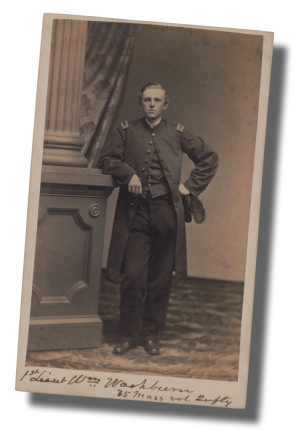
The writer of this letter was 21 year-old Boston architect William Washburn, Jr. (1840-1922), who first enlisted in Co. A, 1st Massachusetts Infantry on May 3, 1861. He was discharged for promotion on Aug. 17, 1862, and commissioned as a 2nd Lt. in Co. G., 35th Regiment Massachusetts Infantry during which time this letter was written. He was promoted to 1st Lt. and commissioned into Field and Staff of the 35th Massachusetts on Oct. 7, 1863. He was wounded and taken prisoner at the Battle of the Crater at Petersburg, Va. on July 30, 1864, and was afterward confined at Macon, Ga., and Columbia, S. C. He was promoted to Captain on Sept. 6, 1864.
Lt. Washburn wrote this letter from across the Rappahannock River from Fredericksburg, just 3 weeks before the disastrous assault against the Confederates commanding the heights behind the city. At the time, the 35th Massachusetts was encamped in a muddy field south of the Phillips House. The regimental history tells us that a “wide view” could be had of Fredericksburg from the Phillips House. “Behind the buildings of the city, upon the hills, earthworks and batteries began to appear, and General Lee and his army were plainly preparing to receive us, when, it ever, our time to cross here should come.”
He wrote of scanning the hills across the river, and based on the amount of smoke arising from Rebel camp fires, had concluded, “that there is a small million of rebels over there.” He further opined that the city would soon be destroyed by shelling as they would surely never surrender it. Finally he wrote with frustration that many of the soldiers are without shoes, and that in his own company, down to 16 men, twelve of them are unable to march any distance because of the worn out condition of their shoes.”

TRANSCRIPTION
Camp Mass. 35th Regt.
Near Falmouth, Va.
November 22d [1862]
Dear Lou,
I’ve been sitting for the last half hour at the door of my tent scanning the hills on the opposite bank of the river, and trying to arrive at some conclusion concerning the numerical force of the enemy in this vicinity. After thirty minutes cogitations, I’ve almost made up my mind that there is a small million of rebels over there for nearly every piece of woods is overhung by a dense cloud of smoke arising from the camp fires. The distance from here is hardly a mile and a half, and although between twenty and thirty batteries from our side are bearing directly upon them, and doubtless the same number—and perhaps more—on their side aiming at us, the camp is as quiet as Boston on the Sabbath day. Both sides are evidently preparing for a tremendous struggle and this is the “calm before the storm.”
Fredericksburg, which is in plain view from the place I write from, is a much smaller city than I expected to find it. It looks very prettily from a distance, situated as it is in a hollow on the banks of a fine river, with very high hills in nearly every side. If its streets present no better appearance upon close inspection than did those of Falmouth, I can’t speak much in its favor as a cleanly city. However, I may not have an opportunity to form an opinion in that respect, for there’s every prospect now of being obliged to shell the place before the rebels will surrender it. In that event, it will probably be entirely destroyed, or so disfigured as to make it impossible to gain an idea of its previous appearance. We have now been here for three days, and during that time the cars have been running constantly to and from Fredericksburg, either bringing reinforcements to, or carrying supplies from there.
Today, the sun has appeared for the first time since arriving in Falmouth. The roads are in a terrible condition from the heavy rains which have just ceased. Wagon trains, ambulances, and every conceivable kind of vehicle traveling the turnpikes, meet with the same fate, viz: “Stuck fast in the mud.” A few days of sunshine will dry up the roads in a measure, and allow the forward movement to go on. Another great drawback to the advance is the want of shoes. Perhaps you will be loathe to believe it, but it is a fact nevertheless, that a great many of our soldiers—even in this new regiment, are entirely destitute of shoes or boots. Some are actually bare-footed, and out of my company alone, numbering now but sixteen, twelve are unable to march any great distance because of the worn out condition of their shoes. Requisition after requisition has been sent in to headquarters, and always with the same result. “You will get them as soon as they come,” is the invariable answer, and in the meanwhile, the soldier is obliged to go around in his bare feet, or wear shoes so full of holes as to render his going any distance without wetting his feet an impossibility. Whose fault is it? If government is unable to better provide for its soldiers than this, at this season of the year, it had much better send the men home for they cannot stand it a great while longer. I’ve sent in a new requisition for shoes for my men this morning, and the only comfort I got was that they were probably on their way from Washington.”
Capt. [William] Gibson has been in…
[Remainder of letter missing]



One thought on “1862: William Washburn, Jr. to Friend “Lou””